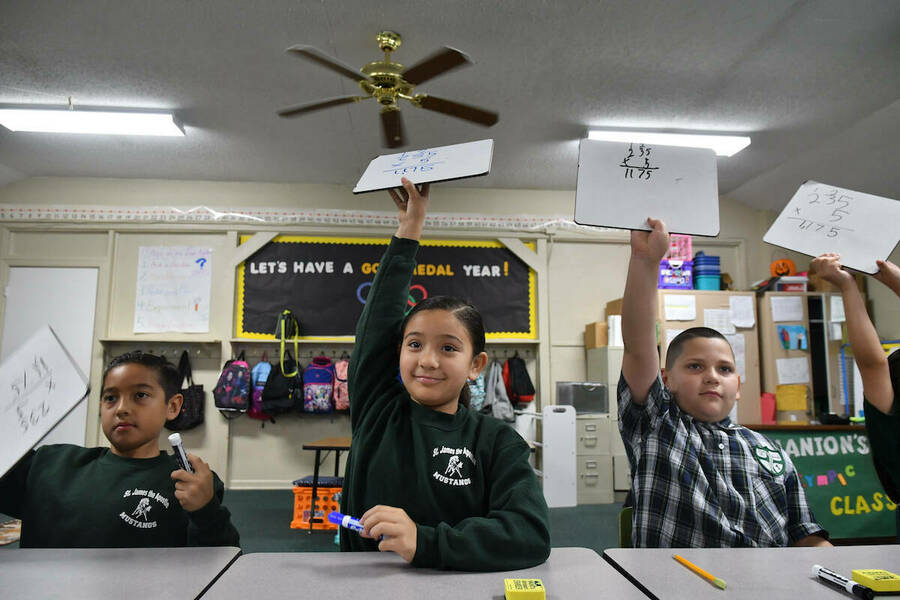Ascent - ACE

Locations
- Catholic Diocese of Sacramento, California
- Catholic Diocese of Stockton, California
Focus Area
- Education
"The ACE Ascent Program model rests on the belief that collaboration within and across schools is instrumental to the future of Catholic education. It is this commitment to community that nurtures a Christ-centered meaning of joy which is the fabric of our Catholic faith."
The Issue
Like any other public or private school, Catholic schools face a number of challenges in educating their students. This is complicated by the decline in Catholic school enrollment and number of Catholic schools in the last decade. As of 2022, there were 5,938 Catholic schools open in the US, compared to more than 11,000 in 1970.
Catholic schools have also struggled with training and retaining high-quality teachers. This has a direct impact on students—a year in class with an ineffective teacher can leave students falling behind their peers academically.
Students need access to high quality teaching more than ever. Between 2020 and 2022, average scores for nine-year-old students declined by five points in reading and seven points in mathematics because of the Covid-19 pandemic. This is the largest reading score drop since 1990, and the first-ever drop in mathematics scores. Teachers need to be equipped with effective strategies for combating this decline, especially in Catholic schools, which are usually smaller and more isolated.
Professional development programs for teachers, in the form of workshops or year-long courses, have demonstrated significant positive impacts on students’ academic achievement. This is especially true in science and mathematics—where many students lag behind. However, this research focuses only on development for teachers. No evidence exists about the effectiveness of professional development programs aimed at school administrators, principals, or teacher leaders. But these in-school leaders can impact students outside of one classroom, which may make them more effective at improving student outcomes and undoing pandemic learning loss.
The Intervention
The Alliance for Catholic Education aims to strengthen K-12 Catholic schools across the country by forming talent, expanding access, and conducting research on school quality. Their goal is to ensure that all children, especially those from low-income families, have access to an excellent Catholic education. One of their programs—ACE Teaching Fellows—places recent graduates in under-resourced Catholic schools for two years, where they teach while also earning a cost-free masters of education.
However, teachers are not the only school employees in need of professional development. The Ascent program aims to form school leaders by elevating the mathematics program and by creating joyful, supportive communities within schools and across Dioceses. K-8 school superintendents, principals, teachers, and staff in two different dioceses—Sacramento and Stockton, CA—will be brought together to complete coursework and attend workshops under a collective leadership model.
By emphasizing spiritual values in the math classroom, Ascent hopes to determine the effectiveness of leadership and professional development programs that integrate Catholic faith.
Research Question
Does the Ascent program have an impact on measures of student achievement, in particular, math test scores?
Intended Outcomes
Students who attend schools with an Ascent-trained teacher will have higher standardized test scores than comparable students at schools without an Ascent teacher.
Research Study Design
The Ascent project is a randomized controlled trial—the gold standard of impact evaluation.
Ascent will be rolled out by ACE over the next five years. However, not all schools can receive the program at the same time. In the face of excess demand, the most fair way to assign Ascent training is at random. LEO researchers will compare student outcomes between schools selected earlier and later in the study to receive an Ascent teacher, which was randomly determined.
Students who attend a school where an Ascent teacher taught will serve as the treatment group. The control group will be students who attend a school without an Ascent teacher. A total of 46 schools from the Sacramento and Stockton Dioceses are participating, and the first year of training is already underway.
LEO researchers will use administrative data on academic performance provided by the Dioceses to evaluate the Ascent program. Additionally, ACE will conduct qualitative research through surveys and interviews to measure the spiritual identity, math instruction confidence, and state of joy for participating teachers.